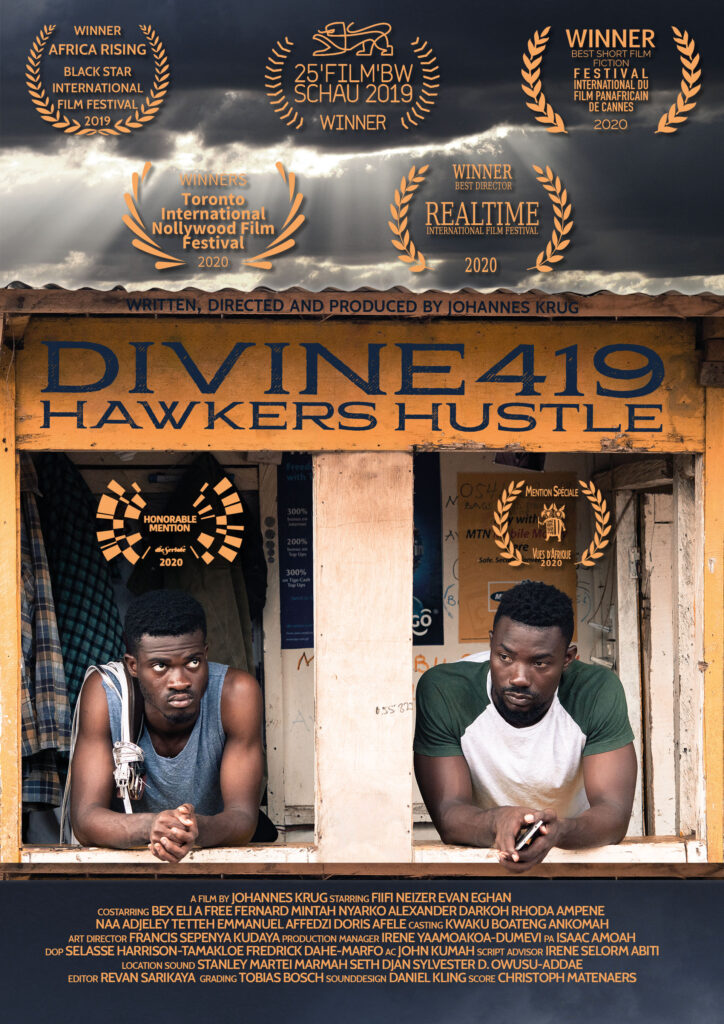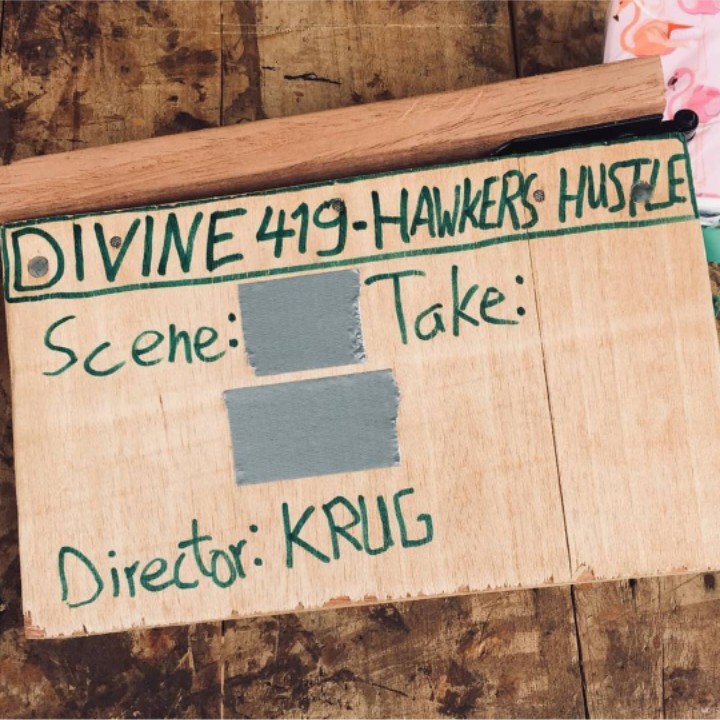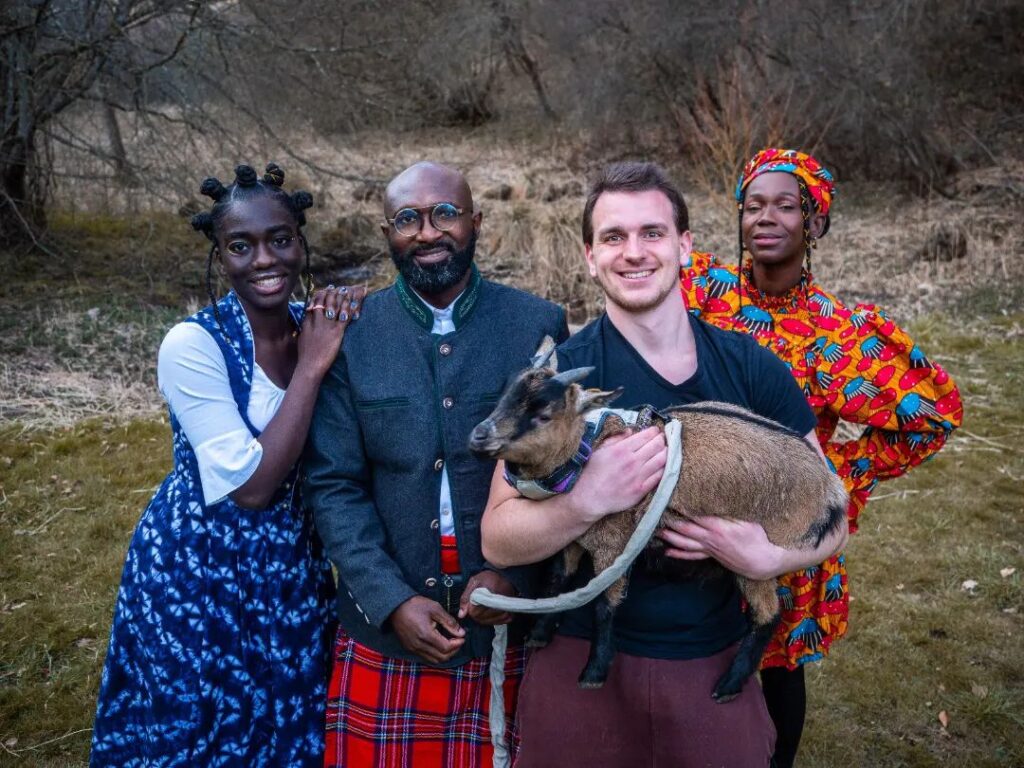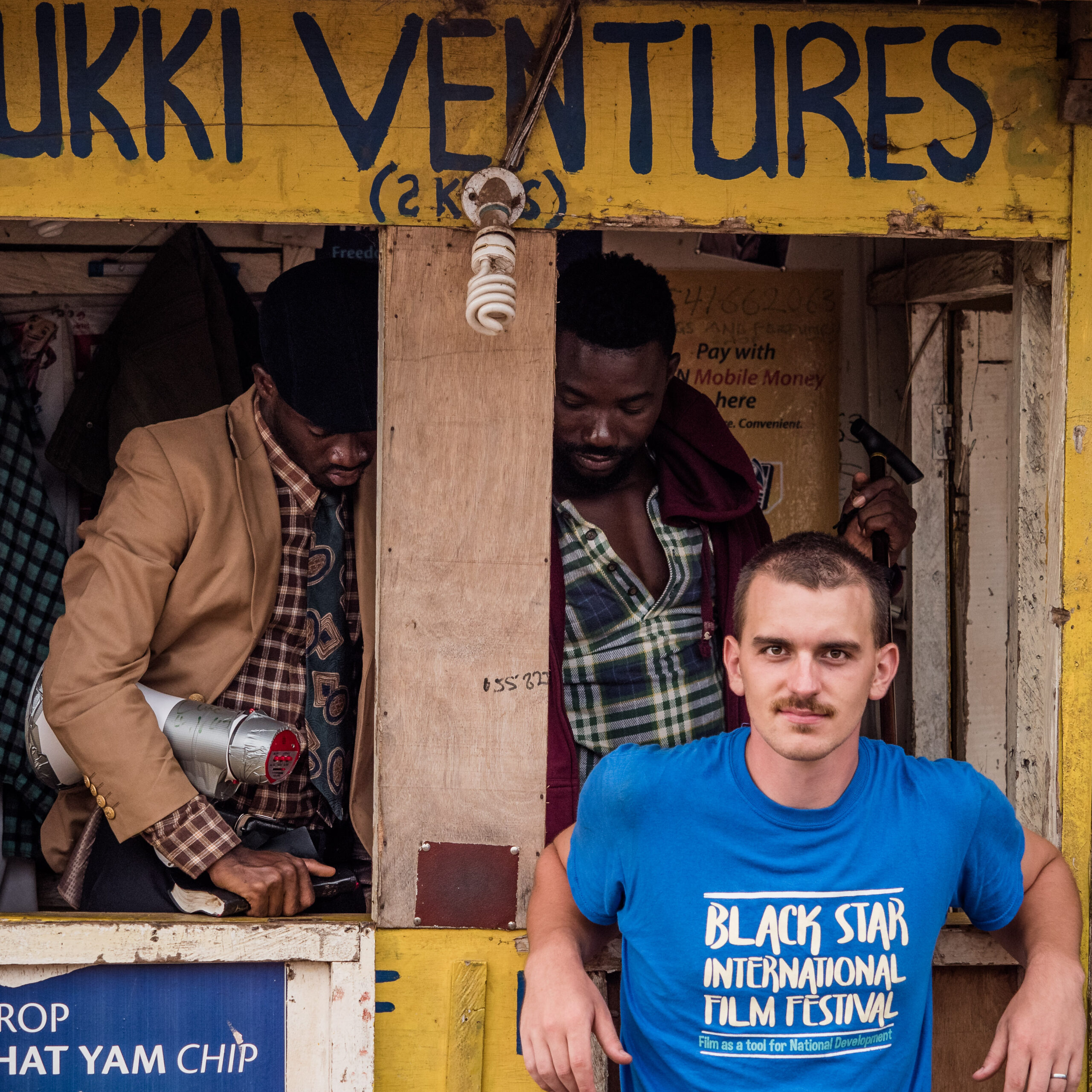“DIVINE419 – HAWKERS HUSTLE” is a compelling, thought-provoking film that delves into the daily struggles of street hawkers in Accra and the exploitation of religion by false prophets. This dramedy, which balances amusement and social critique, has received critical acclaim at numerous global film festivals and is due to premiere on YouTube for the general audience on 11.11.23 at 11 a.m. (UTC+1) via Krug Films. The story revolves around Kwame, a young hawker with aspirations of becoming an actor, whose life takes a turbulent turn, forcing him to rely on faith as a final choice. The film has won a number of accolades, including honors at the Black Star International Film Festival, Filmschau Baden-Württemberg, and the Festival International du Film Panafricain de Cannes, among others, and has been shown at a number of important international film festivals.
Johannes Krug, an acclaimed German director, carved his way in cinema after immersing himself in Ghana and graduating from Stuttgart Media University with a degree in audiovisual media. Further studies in directing, particularly in documentary films, at the prestigious Filmacademy Baden-Wuerttemberg have significantly influenced his storytelling in both fiction and nonfiction genres. His films, which he makes, carefully analyze and critique German and Ghanaian society while reflecting on his personal role, frequently combining a blend of seriousness and humor with unshakable sincerity.
His filmography showcases a range of works, including ‘Black Savior,’ ‘Making of King,’ ‘my past, not your future,’ ‘DIVINE419 – HAWKERS HUSTLE, in our interview with key industry professionals who inspire us, we welcome a creatively multifaceted talent, Johannes Krug!
Could you please introduce Johannes Krug as a film director? How did you first get into the film industry after deciding that film making was your dream job?
As a filmmaker I am driven to tell stories that make the viewers question their perception of societal issues. Because of my German background and my close relationship to Ghana I mostly focus on taking a critical look at German and Ghanaian society while reflecting on my own role in this world, sometimes seriously, sometimes humorously, but always with blunt, authentic honesty.
In my childhood and youth, I never had the plan to become a filmmaker. For me it happened during the process of doing it, that I started to feel a growing interest in the possibilities to express my artistic voice and perhaps have a tiny little impact on the society. But actually, my focus on societal issues and storytelling came in later. When I started making basketball videos in my youth and through that getting slowly into video- and photography I was more fascinated by the technical aspects of the craft, which led me to study a Bachelor in Audiovisual Media at Stuttgart Media University after I returned from a volunteering year in Ghana. During my time there I shot my first documentaries and really enjoyed working with people and telling their stories through film. I then continued my studies at the renowned Film Academy Baden-Wuerttemberg specializing in Directing for Documentary Films. During my time there I realized I want to create both documentary and fiction films as both have their pros and cons and can be used in different ways to tell stories about society.
However even though I completed my Diploma in Directing last year I still haven’t yet had my ‘breakthrough’ in the film industry as I am currently focusing on my life as a family man. Nevertheless, new ideas are in the making and I hope that I will one day be able to pay all my bills from doing what I love.

Your Debut Film, “DIVINE419,” Was Shot In Ghana And Screened At A Number Of International Film Festivals. What Meaning Did This Have For You At The Time, And How Did The Festival Circuit Help The Film’s Journey? Can You Go Into More Detail About The Origins Of The Script And The Short Film, Including The Timeline From Conception To Distribution? Were There Any Significant Script Changes Between Conception And Completion, And How Many Major Drafts Did You Go Through?
DIVINE419 was a learning curve for me and its success and the audience’s feedback actually caught me by surprise but really gave me a big motivation to continue with filmmaking.
I first had the idea for it when I had my first scriptwriting class. With the experiences I made in Ghana I always wondered where all those street preachers come from and why so many Ghanaians give their hard-earned money to these so called ‘men of God’. When I first met my Ghanaian wife Irene in a trotro, I witnessed a situation where one of them was claiming to give ‘free’ prayer booklets to the passengers and when some of them didn’t give him any money in return he started talking about what might happen on the way if he doesn’t pray for our save passage. That wasn’t only the seed of the idea for DIVINE419 but also the beginning of my relationship with my wife. As she had witnessed the same preacher a week earlier and figured out his unethical tactics, she spoke up, crushed him with her arguments and exposed his fraudulent nature. She quite impressed me with that and the moment got permanently imprinted in my memory.
So after I had the concept on my computer for a few years I took it out during my next screenwriting class and was aiming to make it into a series of which I wanted to produce the pilot episode in my semester holidays in Ghana. I wrote the script in a few months and with the help and input of my wife adjusted some scenes and dialogues into a version that was ready for preproduction. Once the actors came on board they had a huge impact on readjusting the dialogues to current pidgin English and the language style of their respective roles, which gave the film a much higher authenticity than the original version of the script.
Why Is An Obruni Attempting To Tell A Ghanaian Story?
Having spent a big part of my adult life in Ghana and being married to a Ghanaian definitely makes me not your average obruni. As a creative you are always inspired by the things happening around you and even though I am not living in Ghana at the moment, it has become my 2nd home and a part of my identity.
Is DIVINE419 a short film or a series, and what does the number 419 stand for?
Both. DIVINE419 was developed as a series. Nevertheless, the pilot episode HAWKERS HUSTLE can stand for itself as a short film. The number “419” refers to the section of the Nigerian Criminal Code dealing with fraud. The term is also widely used in Ghana.

Let’s Take a Look at the Cast and Production Team of “DIVINE419.” Could you tell us about the locations you chose in Ghana and the challenges you faced while filming? What valuable lesson did you learn while making this film, in your opinion? Could you also highlight your favorite scene and the most difficult one?
I produced DIVINE419 as an independent student project, only with a little budget from crowdfunding to cover inevitable costs. Without the phenomenal voluntary work of the various Ghanaian cast and crew members as well as the German postproduction team, we wouldn’t have been able to make it happen. The project was a very spontaneous run & gun style production. I basically booked a ticket to Ghana with my script and equipment in my luggage and a fixed timeframe, but without having anybody on board yet. I knew two weeks after my arrival I would have to have a team and cast and start shooting, cause my time was limited. So, I decided to volunteer at the Black Star International Film Festival for the first few days in order to connect with fellow creatives. And of course, I also spread my cast & crew call on social media and contacted NAFTI etc. I still can’t believe it worked out. With Irene Dumevi, a NAFTI graduate I found a skilled production manager who was a huge help in getting the logistical challenges solved. We scouted Madina together and found great locations with supportive owners. Kwaku Ankomah helped me with his casting experience as this was my first fiction film. My fellow BSIFF volunteers Jojo Ekome and Fernard Mintah Nyarko, who picked me from the airport and supported my vision from the beginning were also a great help in spreading the word about the project and even ended up in front of the camera.
With Fiifi Neizer, Evan Eghan, Bex, Emmanuel Affedzi, Fernard Mintah Nyarko, Rhoda Okobea Ampene, Naa Adjelei Tetteh, Eli a Free and Alexander Darko we had assembled a great cast for the project.
Behind the camera Selasse Harrison Tamakloe stepped up after Fredrick Dahe-Marfo had to leave for classes after a few days of shooting. They both did a great job at implementing the documentary style yet cinematic camera concept I was planning for. Francis Sepenya was solely responsible for the complete art direction handling everything form props, costumes, set design etc. which was only possible cause we shot it in locations that only needed a little tweaking to adjust them to the story.
Everyone else involved from the sound guys to the camera and production assistants also delivered a great job and I can’t say it enough I am thankful for the whole team from cast & crew to postproduction for sharing my vision and putting all their creativity and craft into the project.
I have too many favorite scenes to choose from. One of my favorites and most challenging scenes is obviously the peak scene when the preacher performs his miracle and then has to face the crowd. The actor’s delivery was really on point – the sweat you see on the preacher’s jacket wasn’t fake – it was Fiifi Neizer’s energy that made this scene and the whole film a success, as many festival juries later also stated when awarding the outcome of this great team effort. What was challenging was to get enough extras to play the crowd. We could only organize a handful of people, but as we shot it in a market, we could spontaneously motivate some of the market women to join us and once Fiifi stepped into his role of Prophet Kwame and started preaching, the rest of the crowd just came naturally from the surroundings.
The biggest lesson I’ve learned is when you want to do something, be confident with it and just go for it. If you have the right mindset and ideas, you will eventually be able to convince others to join you on your quest and be able to create a nice piece of art together. Also, its festival success taught me that no matter the financial and technical limitations, what really counts is the authenticity of your story and how it connects to the viewers. With my diploma project Black Savior we had a much higher budget, production value and time put into the complex development of the world building and characters but it hasn’t yet received the same festival interest as DIVINE419 did, which I think one of its reasons might be the lack of authenticity and spontaneous energy that is way more difficult to achieve when you have a huge production with 40 people on set, pressure from all angles and of course a different concept that highlights the satirical nature of things in an alternate universe where the audience needs time to intellectually process the many thoughts that went into the script. Nevertheless, it is a big step up from DIVINE419 in many aspects so people should look forward to it.

As Part Of A New Wave Of Filmmakers, Your Project, “Black Savior,” Has Generated Considerable Anticipation. When Audiences, Especially With The Release Of “DIVINE419” On Youtube, Witness Your Work, What Do You Hope They Take Away From The Film?
Comparing my experiences on Black Savior and DIVINE419 I can say they are two really different projects but at the core what unites them is a humorous yet sometimes dramatic way to criticize current societal issues. Whilst in Black Savior, which I cocreated with Kwaku Ankomah, we take a look at White Saviorism and neocolonial exploitation under the guise of developmental aid, DIVINE419 was targeted at the topics of religious exploitation and naivety but also at what can happen to young people with ambitious dreams in a system with a challenging economy and the lack of family and government support, when they get on the wrong path. So, whilst I hope that the audience is entertained by DIVINE419, I also hope they can get the deeper meaning behind it.
What other projects should we keep an eye out for?
After DIVINE419 you should look out my documentary‚ “my past, not your future” which I will also release on YouTube in 2024. In the film I self-reflect racist traditions in my former catholic youth camp. I also made a documentary called‚ “Making of King” about a Ghanaian living in Germany and being called‚ “the King of Ghana” by the German media. It deals with the cliched image of Africa in German media and the use of stereotypes for the funding of development projects. Unfortunately, this project won’t be available online due to limited rights with the used archive footage but I am always looking for hosts to organize local screenings.
And last but not least, “Black Savior”, my biggest project so far, which I cocreated with Kwaku Ankomah. Is currently on the film festival circuit and will hopefully be released online in 2025. It’s a sociopolitical satire tackling neocolonial exploitation and behavior under the guise of development aid. A cinematic inversion of global power dynamics, Black Savior parodies the quirks of the White Savior Syndrome through the story of an Akan family trying to save the Swabian tribe one goat at a time.
WATCH – DIVINE419 – HAWKERS HUSTLE



